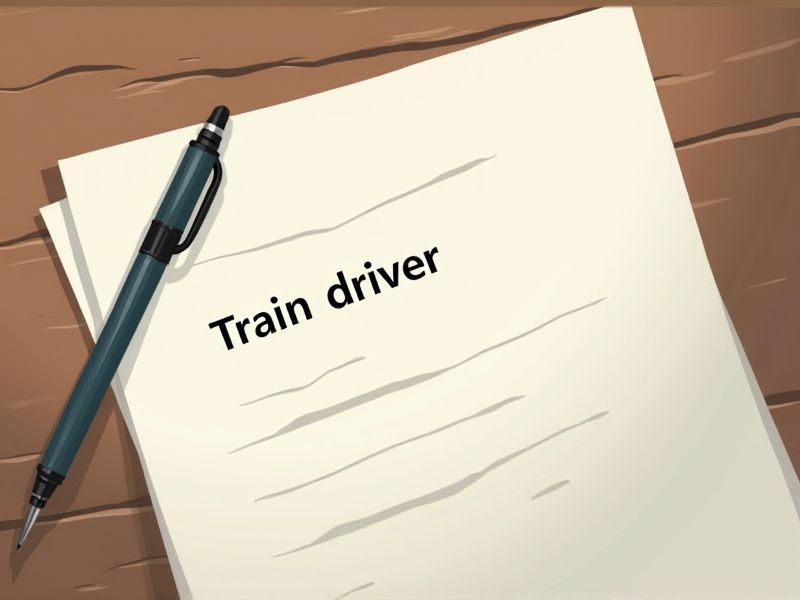
Operating a train demands precision and responsibility, as it involves safely transporting numerous passengers and cargo across long distances. The complexity of modern rail systems requires comprehensive knowledge of signaling, track layouts, and emergency procedures, necessitating specific certifications to ensure competency. Safety protocols are critical, as train drivers must be prepared for unexpected situations that could endanger lives and property. These are key certifications that could be essential for a train driver's role.
Train Operating License
A train operating license is required to ensure that train drivers have the necessary skills and knowledge to operate trains safely. This licensing process includes thorough assessments and training, which help mitigate risks associated with human error. Obtaining a license also standardizes operational procedures across the rail network, promoting efficiency and coordination. Regulatory bodies mandate these licenses to maintain public trust and ensure compliance with safety standards.
Locomotive Operation Certification
Locomotive Operation Certification ensures train drivers possess the necessary skills and knowledge to safely and efficiently operate trains. This certification helps reduce risks of accidents and operational errors caused by unqualified personnel. Regulatory bodies require this certification to maintain standardized safety practices across the rail industry. Certified train drivers contribute to consistent service quality, enhancing passenger trust and infrastructure reliability.
Rail Safety Training Certification
Rail Safety Training Certification is crucial for train drivers to ensure they possess the necessary skills to prevent accidents. Proper certification equips drivers with knowledge about the latest safety protocols and emergency procedures. Trained operators can make informed decisions, reducing the likelihood of human error. Effective training contributes to optimizing operational efficiency while ensuring passenger safety.
Signal Systems Competence Certificate
Signal Systems Competence Certificates ensure train drivers understand complex signaling systems, directly impacting safety and efficiency on the rails. Misinterpretation of signals can cause severe accidents, hence certified training reduces such risks. Technological advancements in train signaling require updated skills, making the certificate crucial for adapting to new systems. Regulatory compliance mandates such certification to maintain industry standards and public confidence in rail transport safety.
Track Inspection and Maintenance Certification
Proper track inspection and maintenance certification ensures train drivers operate in a safe environment, reducing the likelihood of accidents caused by track defects. With this certification, drivers gain knowledge about recognizing and responding to track inconsistencies, enhancing overall railway safety. Training equips drivers with the ability to communicate effectively with maintenance teams, facilitating quicker resolution of track issues. Certified drivers contribute to operational efficiency by minimizing downtime linked to track-related disruptions.
Emergency Response and Rescue Certification
Train drivers operate in environments where emergencies can arise unexpectedly, such as derailments or collisions, because they are responsible for passenger safety. Acquiring Emergency Response and Rescue Certification equips drivers with the skills required to manage crises, which can save lives and minimize injuries. In situations where immediate action is crucial, certified drivers can execute rescue operations efficiently, lessening potential damage. A certified train driver can enhance public trust, as passengers are more confident traveling with trained professionals capable of handling unforeseen events.
First Aid and CPR Certification
Train drivers often encounter medical emergencies among passengers; first aid and CPR certification equips them to respond effectively. Quick action can significantly improve outcomes during health crises in transit. Certification also ensures drivers understand safety protocol, minimizing risks in crisis situations. Regulatory bodies may mandate these certifications to enhance overall passenger safety on railways.
Advanced Brake Systems Certification
Advanced Brake Systems Certification ensures train drivers understand the complex mechanisms of modern braking systems, reducing the likelihood of human error. Train drivers with this certification are better equipped to handle emergency situations, leading to enhanced safety for passengers and cargo. As brake technology evolves, maintaining consistent knowledge through certification helps in aligning driver skills with technological advancements. Regulatory bodies often mandate this certification to uphold industry standards and maintain public trust in rail transport.
Communication and Dispatch Certification
Communication and Dispatch Certification ensures a train driver can effectively interact with control centers to maintain operational safety and efficiency. Proper certification helps in reducing misunderstandings that could lead to accidents or service delays. Rigorous communication training equips drivers to handle emergency protocols accurately. Certification signifies a standard of proficiency, reassuring passengers and stakeholders of the driver's competency.
Operational Efficiency and Incident Management Certification
Train drivers operate complex machinery under strict schedules and varying conditions, necessitating a deep understanding of operational protocols for efficiency and safety. Proper certification in operational efficiency ensures train drivers can maximize service reliability and maintain timeliness. Incident management certification equips drivers with the skills to respond effectively to emergencies, reducing potential risks to passengers and infrastructure. Regulatory bodies often require these certifications to maintain industry standards and enhance public confidence in rail systems.
Summary
When you acquire additional certifications as a train driver, your employability and job security see a significant boost. These certifications enhance your competency, leading to safer and more efficient train operations. Employers often recognize certified drivers with potential for leadership roles and increased salaries. The overall trust and reliability in your capabilities rise, offering more opportunities for career advancement.
